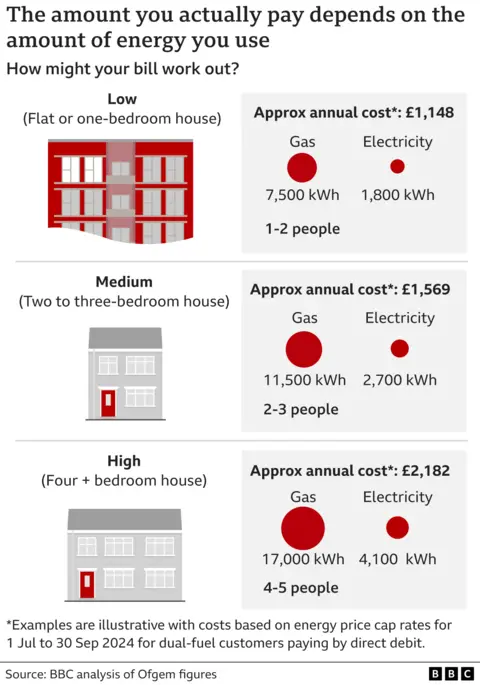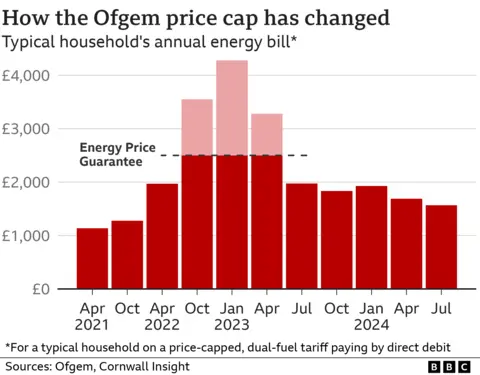By Kevin Peachey, Cost of living correspondent
 Getty Images
Getty ImagesA drop in domestic gas and electricity prices has now taken effect, but costs are expected to rise again in October.
Regulator Ofgem’s new price cap for England, Wales and Scotland came into force on Monday, meaning a typical household’s energy bill will fall by £122 a year.
That brings down the bill for a household using a typical amount of gas and electricity to £1,568 a year, the lowest for two years.
But forecasters expect it to rise again in the run-up to winter, more than reversing the latest drop.
Leading consultancy Cornwall Insight predicts that a typical household’s annual bill will be back up to £1,723 in October, a £155, or 10%, increase from now.
“Modest falls in summer look set to be wiped out by bigger rises in autumn when people will need to put the heating back on,” said Adam Scorer, chief executive of charity National Energy Action.
“The cost of energy remains an unaffordable luxury that many of the poorest simply cannot afford.”
Although the price cap is changed every three months, it is illustrated by Ofgem in terms of an annual bill for a household using a typical amount of gas and electricity.
People in larger properties will tend to pay more overall owing to higher energy usage, and those in smaller properties will pay less.

That is because the cap, set by Ofgem, limits the maximum price that can be charged for each unit of gas and electricity – not the total bill.
It affects the gas and electricity bills of 28 million households, but does not impact customers in Northern Ireland, where the sector is regulated differently but where prices are also falling.
Energy bills are considerably lower than the peak after Russia’s invasion of Ukraine, when the government stepped in to limit bill rises.
That has fed through to falls in the general rate of rising prices, known as inflation.
However, a typical household’s energy bill remains about £400 higher than three years ago, prompting debate over the issue during the election campaign.

In addition, households have built up a collective debt to suppliers of about £3bn owing, primarily, to the pressure from high prices.
Those on prepayment meters, who tend to top up meters during the colder, darker months and are often under more financial pressure, will see a less immediate impact of a drop in prices in the summer.
The vast majority of households pay by direct debit, and their payments are smoothed out over the year. They should have been contacted by their supplier about the latest price changes.
Experts say it is a good idea to take a meter reading now, to ensure billpayers are charged at the correct rate.
Ofgem is reviewing the way the price cap is calculated, including sifting through a host of responses to a consultation on standing charges.
Latest changes in detail
The new prices that took effect for July to the end of September mean:
- Gas prices are now capped at 5.48p per kilowatt hour (kWh), and electricity at 22.36p per kWh
- A typical household uses 2,700 kWh of electricity a year, and 11,500 kWh of gas
- Households on pre-payment meters pay slightly less than those on direct debit, with a typical bill of £1,522
- Those who pay their bills every three months by cash or cheque pay more, with a typical bill of £1,668
- Standing charges – a fixed daily charge covering the costs of connecting to a supply – are unchanged at 60p a day for electricity and 31p a day for gas, although they vary by region

How to keep energy use – and bills – down
Experts have shared three tips to keep on top of energy use during the warmer months:
- If your hot water is too hot to wash your hands in, then your setting is too high so turn the boiler down
- Manage your draughts, such as putting a black bag with scrunched up paper up an unused chimney, or limit other draughts around the home
- Limit time in the shower to four minutes. The charity WaterAid has compiled a playlist of four-minute songs, to keep you to time

